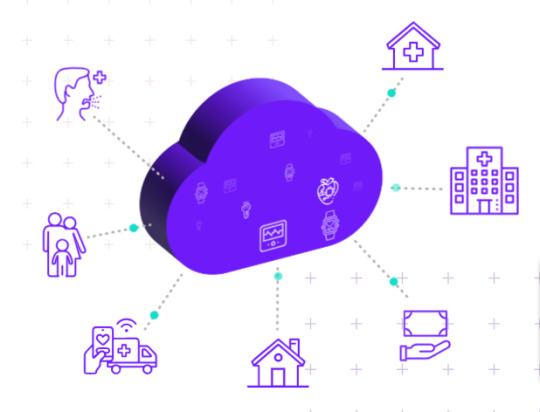#Cloud Computing in Healthcare
Explore tagged Tumblr posts
Text
Transforming Healthcare Delivery with Cloud Solutions
Healthcare cloud solutions are revolutionizing the way medical organizations operate, providing a scalable and efficient infrastructure for managing patient data. By leveraging cloud technology, healthcare providers can enhance collaboration, improve data accessibility, and streamline operations.
One of the primary benefits of cloud computing in healthcare is their ability to facilitate real-time information sharing among healthcare professionals. This connectivity enables seamless communication, allowing for quicker decision-making and coordinated patient care. Additionally, cloud platforms support telemedicine initiatives, expanding access to healthcare services for patients, particularly in remote areas.
Security is a critical concern in healthcare, and modern cloud solutions address this with advanced encryption and compliance features. Providers can ensure that sensitive patient data is protected while adhering to regulations such as HIPAA.
Cost-effectiveness is another significant advantage. Cloud solutions typically operate on a pay-as-you-go model, allowing healthcare organizations to scale their services according to their needs without substantial upfront investments.
In conclusion, healthcare cloud solutions are essential for enhancing operational efficiency, improving patient care, and ensuring data security. As the healthcare landscape continues to evolve, adopting these innovative technologies will be key for organizations seeking to thrive in a competitive environment.
#healthcare cloud#cloud computing in healthcare#cloud health technologies#cloud computing and healthcare#cloud computing for healthcare#healthcare cloud computing#cloud healthcare solutions#cloud solution for healthcare#Healthcare cloud services#Healthcare cloud solutions#cloud computing healthcare#healthcare cloud software#CUSTOM HEALTHCARE CLOUD SOLUTIONS#HEALTHCARE CLOUD SOLUTIONS DEVELOPMENT SERVICES#cloud solutions for healthcare#cloud healthcare#custom cloud solutions
0 notes
Text
Dominating the Market with Cloud Power

Explore how leveraging cloud technology can help businesses dominate the market. Learn how cloud power boosts scalability, reduces costs, enhances innovation, and provides a competitive edge in today's digital landscape. Visit now to read more: Dominating the Market with Cloud Power
#ai-driven cloud platforms#azure cloud platform#business agility with cloud#business innovation with cloud#capital one cloud transformation#cloud adoption in media and entertainment#cloud computing and iot#cloud computing for business growth#cloud computing for financial institutions#cloud computing for start-ups#cloud computing for travel industry#cloud computing in healthcare#cloud computing landscape#Cloud Computing solutions#cloud for operational excellence#cloud infrastructure as a service (iaas)#cloud migration benefits#cloud scalability for enterprises#cloud security and disaster recovery#cloud solutions for competitive advantage#cloud solutions for modern businesses#Cloud storage solutions#cloud technology trends#cloud transformation#cloud-based content management#cloud-based machine learning#cost-efficient cloud services#customer experience enhancement with cloud#data analytics with cloud#digital transformation with cloud
1 note
·
View note
Text
0 notes
Text

Transform Medical Devices into Connected-Care Solutions with BioT’s No-code Platform
1 note
·
View note
Link
Rapid adoption of EHR and increasing penetration of remote patient monitoring to propel Cloud Computing in Healthcare market growth. In 2018, North America...
0 notes
Text
Our Cloud App Development services help you ensure a seamless transition of business applications and data to leading cloud platforms such as Microsoft Azure, AWS, GCP, VMWare, IBM, and other enterprise solutions.
#zymr#cloud app development services#cloud computing in healthcare#cloud app development#qa automation#qa testing
0 notes
Link
The global market size for cloud computing in healthcare is likely to cross 80 billion by 2025.
0 notes
Link
Cloud computing & managed infrastructure solutions are helping healthcare institutions transform their setup digitally and run better than ever. Cloud-based platforms offer unprecedented levels of cost savings, security, automation, and cloud infrastructure – all of which contribute to better operability, profitability, and patient care.
0 notes
Text
Revolutionizing Healthcare: The Role of Cloud Computing in Modern Healthcare Technologies
In today’s digital era, cloud computing is transforming industries, and healthcare is no exception. The integration of cloud computing healthcare technologies is reshaping patient care, medical research, and healthcare management. Let’s explore how cloud computing is revolutionizing healthcare and the benefits it brings.

What is Cloud Computing in Healthcare?
Cloud computing in healthcare refers to the use of remote servers to store, manage, and process healthcare data, rather than relying on local servers or personal computers. This technology allows healthcare organizations to access vast amounts of data, collaborate with other institutions, and scale operations seamlessly.
Download PDF Brochure
Key Benefits of Cloud Computing in Healthcare
Enhanced Data Storage and Accessibility Cloud technology allows healthcare providers to store massive volumes of patient data, including medical records, images, and test results, securely. Clinicians can access this data from anywhere, ensuring that patient information is available for timely decision-making.
Improved Collaboration Cloud-based healthcare platforms enable easy sharing of patient data between healthcare providers, specialists, and labs. This facilitates better collaboration and more accurate diagnoses and treatment plans, especially in multi-disciplinary cases.
Cost Efficiency The cloud reduces the need for expensive hardware, software, and in-house IT teams. Healthcare providers only pay for the resources they use, making it a cost-effective solution. Additionally, the scalability of cloud systems ensures they can grow as healthcare organizations expand.
Better Data Security Protecting sensitive patient information is critical in healthcare. Cloud computing providers invest heavily in data security measures such as encryption, multi-factor authentication, and regular audits, ensuring compliance with regulatory standards like HIPAA.
Telemedicine and Remote Patient Monitoring Cloud computing powers telemedicine platforms, allowing patients to consult with doctors virtually, from the comfort of their homes. It also enables remote patient monitoring, where doctors can track patients' health metrics in real time, improving outcomes for chronic conditions.
Advanced Data Analytics The cloud supports the integration of advanced data analytics tools, including artificial intelligence (AI) and machine learning (ML), which can analyze large datasets to predict health trends, track disease outbreaks, and personalize treatment plans based on individual patient data.
Use Cases of Cloud Computing in Healthcare
Electronic Health Records (EHRs): Cloud-based EHRs allow healthcare providers to access and update patient records instantly, improving the quality of care.
Genomics and Precision Medicine: Cloud computing accelerates the processing of large datasets in genomics, supporting research and development in personalized medicine.
Hospital Information Systems (HIS): Cloud-powered HIS streamline hospital operations, from patient admissions to billing, improving efficiency.
Challenges in Cloud Computing for Healthcare
Despite its numerous benefits, there are challenges to implementing cloud computing in healthcare. These include:
Data Privacy Concerns: Although cloud providers offer robust security measures, healthcare organizations must ensure their systems are compliant with local and international regulations.
Integration with Legacy Systems: Many healthcare institutions still rely on outdated technology, making it challenging to integrate cloud solutions smoothly.
Staff Training: Healthcare professionals need adequate training to use cloud-based systems effectively.
Request Sample Pages
The Future of Cloud Computing in Healthcare
The future of healthcare will be increasingly cloud-centric. With advancements in AI, IoT, and big data analytics, cloud computing will continue to drive innovations in personalized medicine, population health management, and patient care. Additionally, with the growing trend of wearable devices and health apps, cloud computing will play a crucial role in integrating and managing data from diverse sources to provide a comprehensive view of patient health.
Conclusion
Cloud computing is not just a trend in healthcare; it is a transformative force driving the industry towards more efficient, secure, and patient-centric care. As healthcare organizations continue to adopt cloud technologies, we can expect to see improved patient outcomes, lower costs, and innovations that were once thought impossible.
Embracing cloud computing in healthcare is essential for any organization aiming to stay at the forefront of medical advancements and patient care.
Content Source:
2 notes
·
View notes
Text

TOP 10 courses that have generally been in high demand in 2024-
Data Science and Machine Learning: Skills in data analysis, machine learning, and artificial intelligence are highly sought after in various industries.
Cybersecurity: With the increasing frequency of cyber threats, cybersecurity skills are crucial to protect sensitive information.
Cloud Computing: As businesses transition to cloud-based solutions, professionals with expertise in cloud computing, like AWS or Azure, are in high demand.
Digital Marketing: In the age of online businesses, digital marketing skills, including SEO, social media marketing, and content marketing, are highly valued.
Programming and Software Development: Proficiency in programming languages and software development skills continue to be in high demand across industries.
Healthcare and Nursing: Courses related to healthcare and nursing, especially those addressing specific needs like telemedicine, have seen increased demand.
Project Management: Project management skills are crucial in various sectors, and certifications like PMP (Project Management Professional) are highly valued.
Artificial Intelligence (AI) and Robotics: AI and robotics courses are sought after as businesses explore automation and intelligent technologies.
Blockchain Technology: With applications beyond cryptocurrencies, blockchain technology courses are gaining popularity in various sectors, including finance and supply chain.
Environmental Science and Sustainability: Courses focusing on environmental sustainability and green technologies are increasingly relevant in addressing global challenges.
Join Now
learn more -

#artificial intelligence#html#coding#machine learning#python#programming#indiedev#rpg maker#devlog#linux#digital marketing#top 10 high demand course#Data Science courses#Machine Learning training#Cybersecurity certifications#Cloud Computing courses#Digital Marketing classes#Programming languages tutorials#Software Development courses#Healthcare and Nursing programs#Project Management certification#Artificial Intelligence courses#Robotics training#Blockchain Technology classes#Environmental Science education#Sustainability courses
2 notes
·
View notes
Text
2 notes
·
View notes
Text

Revolutionizing healthcare: How cloud computing is transforming patient care and medical research.
2 notes
·
View notes
Text
Unlock Your Potential: Step-By-Step Tutorials to Master New Tech Skills
Introduction: Are you looking to expand your skill set and unlock your potential in the tech industry? With the rapid pace of technological advancement, mastering new tech skills is essential to stay competitive in today’s job market. Fortunately, there are step-by-step tutorials available to help you learn and hone your skills. In this article, we’ll explore how you can unlock your potential…
#advancements in artificial intelligence#cybersecurity best practices#emerging tech innovations#future of blockchain technology#guide to cloud computing#how to choose tech solutions for businesses#how to use new tech gadgets#impact of technology on business#Latest technology trends 2024#reviews of the latest tech products#tech tips and tutorials.#technology for smart homes#technology in healthcare#top technology startups#trends in mobile technology
0 notes
Text
Penggunaan Cloud Computing dalam Pengembangan AI: Alat dan Platform yang Meningkatkan Efisiensi
Cloud computing telah menjadi salah satu inovasi teknologi paling signifikan dalam dekade terakhir. Dalam pengembangan kecerdasan buatan (AI), peran cloud computing sangat penting karena memungkinkan pengembang untuk memanfaatkan infrastruktur dan layanan yang fleksibel, skalabel, dan hemat biaya. Dengan semakin kompleksnya algoritma AI dan meningkatnya kebutuhan akan data besar (big data), cloud…
#AI democratization#AI development#AI generative models#AI in e-commerce#AI in healthcare#AI in manufacturing#AI platforms#AI trends 2025#artificial intelligence#cloud computing#cloud computing benefits#cloud-based AI tools#cloud-native AI#edge computing#efficiency in AI#future of AI#Kubernetes for AI#machine learning#quantum computing#serverless computing
0 notes
Link
Rapid adoption of EHR and increasing penetration of remote patient monitoring to propel Cloud Computing in Healthcare market growth. In 2018, North America...
0 notes